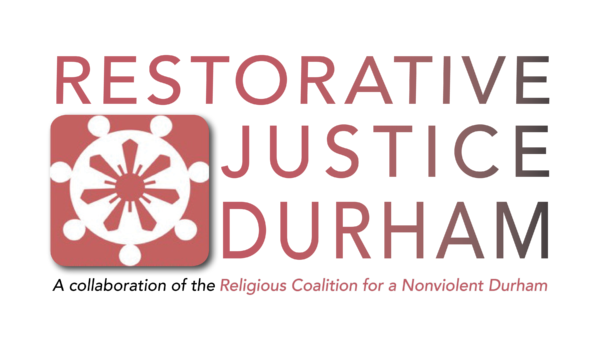RESTORATIVE JUSTICE

 Launched in 2017, Restorative Justice Durham (RJ Durham) is an RCND collaboration to develop community, volunteer, and institutional support for restorative justice practices in Durham’s criminal justice system. Working alongside volunteers, community partners, and criminal justice practitioners, we seek a restorative justice process that repairs of harm of crime and restores the relationships—both individual and collective—that were hurt by wrongdoing.
Launched in 2017, Restorative Justice Durham (RJ Durham) is an RCND collaboration to develop community, volunteer, and institutional support for restorative justice practices in Durham’s criminal justice system. Working alongside volunteers, community partners, and criminal justice practitioners, we seek a restorative justice process that repairs of harm of crime and restores the relationships—both individual and collective—that were hurt by wrongdoing.
What is restorative justice?
Restorative Justice (RJ) is an alternative form of justice. It centers the needs of the people and communities harmed by wrongdoing, and provides an opportunity for people who caused harm to take responsibility for their actions. This enables RJ to engage all those affected in the creation of a plan to repair the harm, through a process grounded in Circles and guided by shared communal values.
Who is Restorative Justice Durham?
Restorative Justice Durham began in 2017 as a volunteer-led, collaborative effort to foster the transformative practice of restorative justice within our Durham community and the criminal legal system. Our RJ practice emerges from the 28-year work of Religious Coalition for a Nonviolent Durham, an interfaith non-profit organization committed to coming alongside surviving loved ones of homicide victims and neighbors returning from long-term incarceration. Today, our work rests in the diverse experience of over 70 trained facilitators, people of many faiths (and no particular faith) whose shared values guide everything we do. Among those, RJDurham particularly commits to core values of Respect, Integrity, Responsibility, and Honesty.
What happens in an RJ process?
The RJ Process brings together the person harmed (the “victim”) and the person who caused the harm (the”defendant”), alongside their supporters and community members, to talk about the incident of harm in a confidential, facilitated conversation. All participants work together to create an agreement for how the person who caused harm can take responsibility for their actions. RJ is always voluntary. If a person harmed does not want to meet with the person who caused harm, RJ Facilitators prepare a surrogate to represent the person harmed at the Conference Circle.
A typical RJ process involves four phases:
- 1) Pre-Conferencing – Preconferences are informal conversations that usually take one to three hours. The purpose of preconferences is to prepare for a Conference Circle. RJ Facilitators meet with affected people separately, including the person(s) harmed, the person(s) who caused harm, and their chosen supporters (e.g. family, friend, clergy, neighbor). Facilitators explain restorative justice and the Conference process, and discuss the core questions that guide every Conference Circle. Each person then decides if they want to continue the RJ process.
- 2) Conference Circle – The Conference Circle usually takes two hours, and is a facilitated conversation among the people involved in and affected by the incident of harm. RJ Facilitators guide the process while all involved answer the core questions and develop an agreement on what the person who caused harm can do to make things as right as possible. This is called a Repair Agreement.
- 3) Repair Agreement – During this phase the person who caused harm fulfills all obligations of the Repair Agreement. The amount of time for a person who caused harm to fulfill the Repair Agreement varies.
- 4) Closing Circle – At the end of the process a Closing Circle is held to determine if the obligations of the Repair Agreement have been fulfilled. This includes a chance for all participants to reflect on whether justice has been achieved.
So what are the Restorative Justice Questions?
- 1) What happened?
- 2) What were you thinking and feeling at the time?
- 3) What have you thought about and felt since?
- 4) Who has been affected and how? [For the person who caused harm…] / What impact has this incident had on you and others? [For the person harmed…]
- 5) What needs to be done to repair the harm as much as possible?
How is confidentiality protected?
Everything in a restorative justice process with RJDurham is confidential and will never be used against anyone. This confidentiality is assured by a Confidentiality Agreement signed by the prosecutor and the defense attorney in each case.
Join us for Community Circles!
As the Covid-19 pandemic continues, Restorative Justice Durham has adapted our monthly Community Circles to meet remotely via Zoom. We welcome any and all to our circles held each third Wednesday morning from 10:00–11:30 OR Thursday evening from 7:00–8:30.
Our monthly circles provide an ongoing space to explore and foster the restorative justice values of RJDurham, and to ground our RJ work in the community we share. All are welcome to join us as we grow our capacity for reflective listening and non-judgmental presence.
Contact Us!
To obtain log-in information for the Zoom call, refer a case, or learn more about RJDurham, contact our RJ Coordinator Leah Wilson-Hartgrove at restorativejusticedurham@gmail.com.